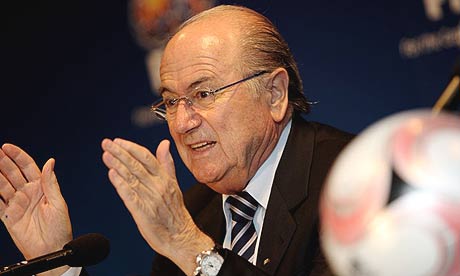
Sepp Blatter's longevity as Fifa president suggests he's a canny politician, but he can certainly be a clumsy communicator. Today he is quoted as suggesting Manchester United's refusal to sell Cristiano Ronaldo to Real Madrid is tantamount to "modern slavery". To any sane person comparing the lot of a 23-year-old receiving some £100,000 per week for playing football to that of a slave sounds outrageous. Even Uefa communications director William Gaillard felt moved to interject. "It would be useful to remind people that slaves in all of the slavery systems never earned a wage," he said.
Blatter seems to be confused, not just on the definition of slavery but on what he himself wants. After all, his declaration today that "I'm always in favour of protecting the player, and if the player wants to leave, let him leave," directly contradicts statements he made earlier this year, when he insisted that players' failure to comply with the terms of their contracts would destroy the very fabric of football. Reacting to the Court of Arbitration for Sport's ruling in the Andy Webster case in February, which paved the way for players to walk away from clubs having served only a portion of their agreed time, Blatter bleated: "Because of this unfortunate decision, the principle of contractual stability, as agreed in 2001 with the European Commission as part of the new transfer regulations and which restored order to the transfer system, has been deemed less important than the short-term interests of the player involved."
So what does Blatter want? His call for United to release Ronaldo, who only last year signed a new five-year deal at Old Trafford, suggests the Fifa president is effectively calling for the application of one-sided contracts (since he presumably doesn't think United should be allowed sack a player if he gets injured, for example). By extension he may also be demanding the abolition of the transfer market – for if players can leave whenever he wants, that must include when the clubs don't agree a fee. Clubs effectively wouldn't have playing assets, a situation that would even further skew football for the benefit of whichever clubs can afford to pay the highest wages. Players would enjoy the same freedom the rest of us do.
Fifa's enemies in clubs will no doubt wonder whether Blatter's cry for freedom extends to the international game? Why shouldn't a player also be allowed to change country when he feels like it? If, for example, Emmanuel Adebayor qualified for a UK passport through residency, shouldn't he be allowed, if he so desired, to suddenly turn his back on Togo and try his luck with England (or Scotland, or Wales or Northern Ireland?)? What would become of Blatter's precious World Cup then? Qatar would win it every time.
Most likely, Blatter's latest declarations are merely the blather of someone who often speaks without thinking. It's a pity he didn't devote more thought to his wording. Because slavery, or at least rank misery, does indeed exist in football, and comparing Ronaldo's case to the genuinely heart-rending ones is flippant and unwise. Football slaves, contrary to what Gaillaird said, do earn wages – just fiendishly low ones that barely even enable subsistence.
In the 1970 and 80s many European clubs, notably in Belgium, began luring young Africans with long contracts that sounded lucrative but were in fact deeply exploitative of the fact that the players had little idea of the cost of living in Europe: to a poor young Ghanaian, say, $200 per month seemed a lot – it was only after leaving his homeland that he realised he'd committed himself to years of poverty far from home. If the player didn't make the grade, clubs never bothered improving their deals and no one ever explained how to sue for constructive dismissal or what not.
Similar practices are still rife today, with aspirant professionals, often in their early teens, being trafficked all over the world on the basis of tricks and delusions, as reported here. Third-party ownership of players can facilitate this, helping trap players in penury and leave them vulnerable to further manipulation. Blatter would do well to address this.
What Blatter's comments today reflect most strongly is the ongoing paradoxical struggle within football: preserving a shred of equality among clubs (and countries) entails trying to discriminate between players. Empowering players to liberate themselves from abusive or unfulfilling contracts also allows the likes of Ronaldo, Gareth Barry and Adebayor to skedaddle at the drop of a wad. Does football want it both ways?

